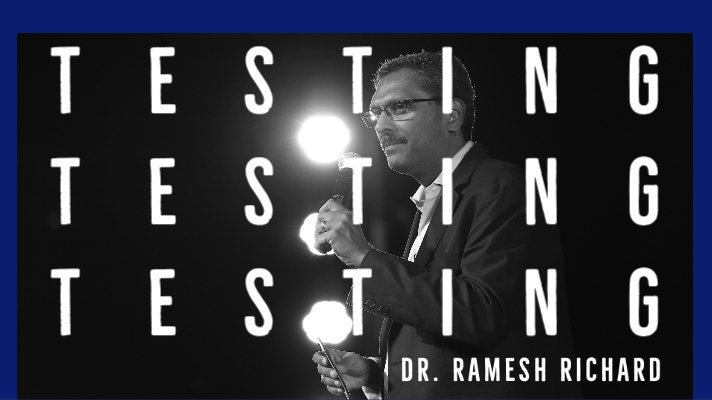
The Pastor’s Wife Survival Kit
October 25, 2018
The Pastor as Public Theologian: Is This His Role?
November 1, 2018How One Pastor Prepares A Sermon

This article “How One Pastor Prepares a Sermon” is shared with permission from Pastor Josh Reich.
I’m often asked by other pastors or church planters about how I prep a sermon. While these aren’t so much things you should do, these are things that are principles for me and shape how a sermon goes from nothing to something.
1. Plan ahead. My goal is to know 18 months in advance what I plan to preach on. This is crucial to my process. I’m a big believer that the Holy Spirit is just as likely to talk to me about a sermon 18 months before I preach it as He is the day before I preach it.
I start by getting away and praying through what am I learning right now, how God is challenging or convicting me personally, and if there is anything in that for my church or is it just for me. I also keep a list of questions I get asked by people in our church through emails and conversations and look to see if there are any common themes to them. During this time I also look back to see what we’ve preached on, what books we’ve covered, how long has it been since we preached through an Old Testament book or a gospel, and when was the last relationships series. I’ll ask leaders in our church about conversations they are having, questions they have, and books they think we should preach through.
Then I take all of these notes and pray over them, seeing what jumps out. I’ll read through certain books of the Bible to get a sense of what God might want to say to our church. After spending several weeks praying and thinking through this, I’ll share with our team what I’m thinking. At this point it is between penciled in and permanent marker.
We’ve changed series at the last minute and tossed something we had been planning to do for over a year. That happens, and you have to be flexible.
I’ll be honest; this step is by far the hardest part of sermon prep. It takes the most time and has the least amount of immediate payoff, which is why most guys don’t do it. I meet so many guys who are just week-to-week or month-to-month.
2. Research. Once I have a sermon outlined, meaning I create what passages I’ll do on which week, how I’ll break up a book of the Bible, I go to work on researching it. I’ll create a notebook in Evernote and then a notebook in that folder for each week of the series. When I come across an article, a podcast or a blog, I simply hit the shortcut button on my chrome bar and put it into the folder. This is incredibly helpful when you are preaching on a controversial topic like homosexuality. At this point I might read the article, but I’m just gathering things. This is one of the biggest advantages to planning ahead in preaching.
For example, in the summer of 2017 I’m planning to do a series on spiritual practices or disciplines. So right now I’m pulling stuff on how habits are formed, looking at spiritual disciplines and how to best communicate and practice things like reading your Bible, fixed hour prayer, silence and solitude, fasting, etc.
3. A few months out. At this point, I start reading books that cover some of the topics I’ll be preaching on. I started preaching through Romans in March 2016, and so towards the end of 2015 I began reading books by John Piper and others on the book of Romans and some of what is covered in the book.

4. The week of. The week of a sermon is what most people think of when they think about preparing a sermon. And while I spend about 20 hours a week on sermon prep, as you can see, it is not all dedicated to the current sermon.
On Monday morning I spend a couple of hours preparing my heart by listening to worship music, reading some soul reading (John Piper or someone who has been dead for centuries) and reading through the passage I’ll preach on. I write out what stands out, what God is saying to me through the passage, etc. I think the most powerful part of a sermon is when the pastor says, “And here’s how this passage has been working on me this week.”
Monday or Tuesday I’ll start working through commentaries. When I started out I would read 8 – 10 commentaries and gather so much information that I never used it all. Most commentaries say the same things. Go to www.bestcommentaries.com and buy the top ones. My favorites are the NICNT or NICOT, The Message series by John Stott and the NIV Application Commentary. I’ll veer from that depending on reviews, but those are typically the ones I use.
I’ll also pull up the Evernote folder at this point and look through it. What is helpful, what can I use, etc.
My goal is to have all of my sermon stuff largely done by Wednesday at noon. This gives our team time to edit what goes in the program, what is on the screen and to make sure our next steps stuff is all ready to go.
At this point the sermon isn’t done, but is cooking.
5. Saturday. Every week I make a playlist on Spotify of the songs that the band is going to be doing. On Saturday afternoon I’ll take a run, listen to that playlist and pray through my sermon, the people who will be there, the things on my heart. This is such a crucial time for me and what God is doing in my heart as I prepare.
6. Sunday morning. I try to be sitting at my computer by 5:30 on Sunday morning. This is a final time to prepare for the day. I look at my heart, confess sin, and listen to worship music, go over my notes and edit them down. I also do my best to memorize my intro and conclusion. How will I present the gospel? How will I lay out the challenge? While I try to not look at my notes, I want the beginning and the end to be as solid as possible.
Then like all pastors, I drive home on Sunday with things I wished I had said or said differently.
But then I get to do it all over again the next Sunday!



